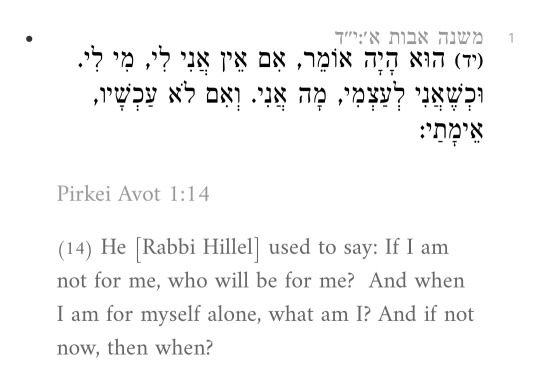#sefaria
Text
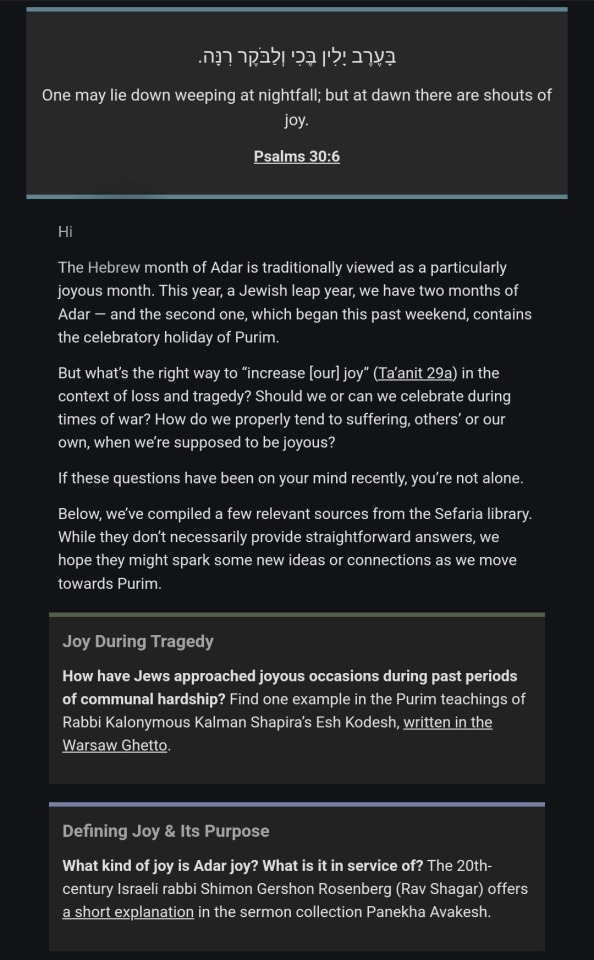

Shout-out to Sefaria for this beautiful drash. This was a really sweet thing to receive in my inbox, and I thought some of you all might appreciate it, too.
315 notes
·
View notes
Text

This line from a midrash is killing me. Naming my son "See the Normal Man" because he's just so fucking Normal.
498 notes
·
View notes
Text
Catch me on sefaria when twitter dies
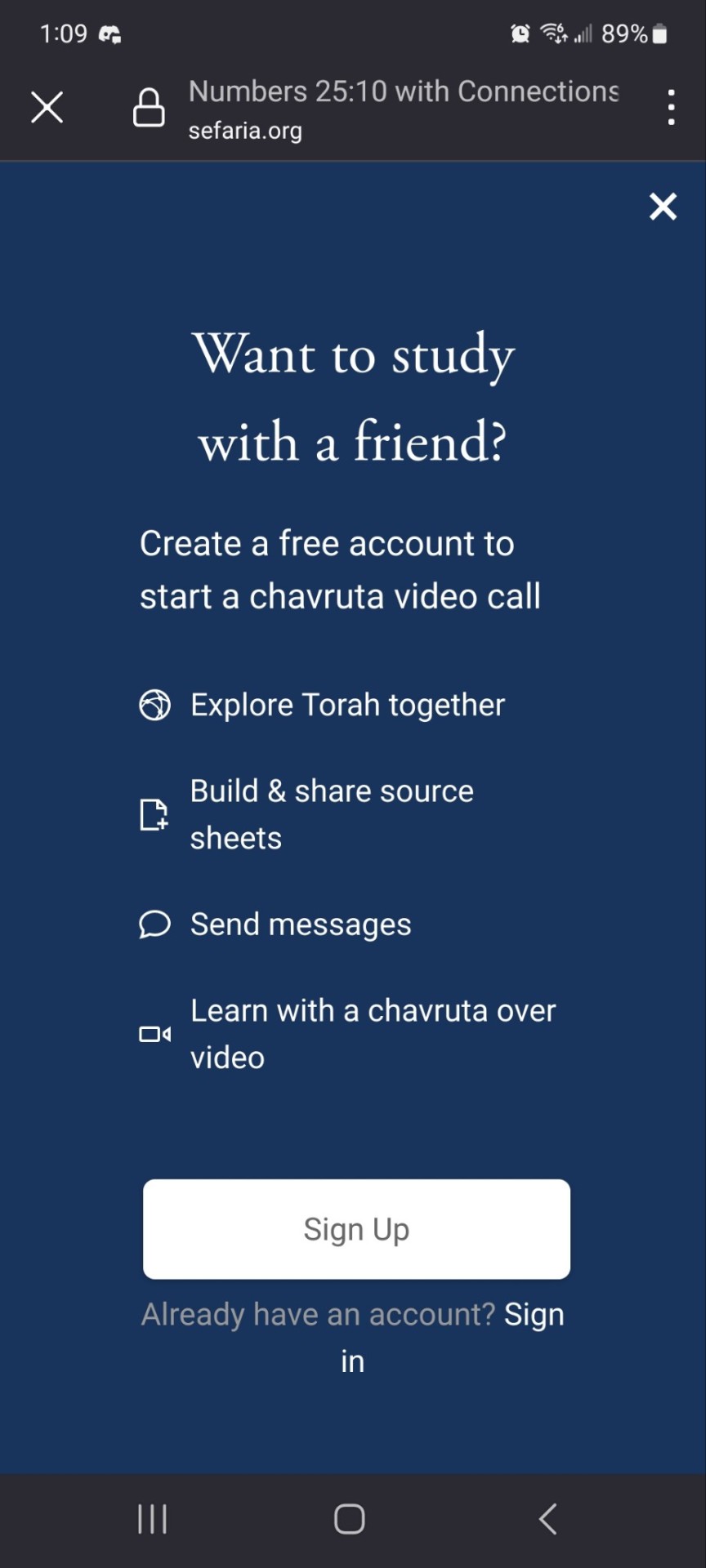
13 notes
·
View notes
Text
But Ruth replied, “Do not urge me to leave you, to turn back and not follow you. For wherever you go, I will go; wherever you lodge, I will lodge; your people shall be my people, and your God my God. Where you die, I will die, and there I will be buried. Thus and more may the LORD do to me if anything but death parts me from you”.

Ruth 1:16-17 via Sefaria
3 notes
·
View notes
Text

sefaria my beloved
#sefaria#i created this for a specific purpose#and it's the funniest thing ever rn but also it's late#rory rambles
3 notes
·
View notes
Text
well this is going to make me feel stuff while davening
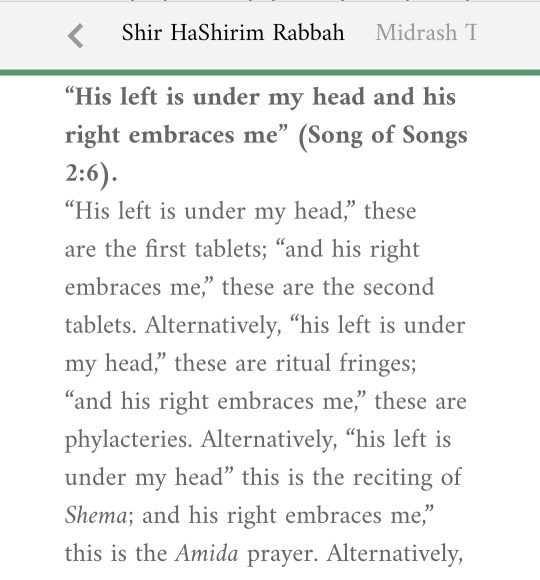
7 notes
·
View notes
Text

Does the Phrase Ἔτι ἅπαξ in Hebrews 12.26 Mean “Once” or “Once More”❓
By Bible Researcher Eli Kittim 🎓
The New Testament Versions
There are various theories about past catastrophic Biblical events. For example, some biblical narratives describe a time when the earth trembled, such as the mighty earth-quake at Mount Sinai when God gave Moses the Ten Commandments, or the cataclysmic Noachian Deluge. Some Biblical scholars even theorize about a so-called “Gap Theory" (between the first and second verses of Genesis) regarding two different creations, or even an earlier creation-and-destruction of the universe prior to the current one.
So when we encounter biblical verses that seem to suggest some type of primordial earthly destruction, scholars often theorize about the probability of such events taking place as the ones mentioned above. Hebrews 12.26 is a case in point. It talks about some form of judgment in which God “will shake not only the earth but also the heavens.” But there seems to be a difference of opinion as to whether or not this event will happen for the very first time. That’s because the key phrase Ἔτι ἅπαξ has been variously translated in two different ways: “once” and “once more.” The former suggests a first time, the latter, a second. Hence, the meaning of the text remains an open question. Hebrews 12.26 (SBLGNT) declares:
οὗ ἡ φωνὴ τὴν γῆν ἐσάλευσεν τότε, νῦν δὲ
ἐπήγγελται λέγων · Ἔτι ἅπαξ ἐγὼ σείσω οὐ
μόνον τὴν γῆν ἀλλὰ καὶ τὸν οὐρανόν.
Translation (NIV):
At that time his voice shook the earth, but
now he has promised, ‘Once more I will
shake not only the earth but also the
heavens.’
Most of the Bible versions of Hebrews 12.26 (with the exception of a few that I’m aware of) translate Ἔτι ἅπαξ as “once more.” That’s because Ἔτι can mean not only “still,” “yet,” “again,” but it can also relate to *time* and mean “longer” (Mt. 5.13; Lk 16.2; 20.36; Jn 7.33), “further” (Mt. 26.65; Lk 22.71), as well as “moreover” (Acts 2.26).
So, if the correct translation of Heb. 12.26 is “Once more I will shake not only the earth but also the heavens,” then the question arises: is this verse referring to Mt Sinai, the flood, the gap theory, or perhaps to a previous universe that was once-destroyed to make way for the creation of our own?
For example, one particular Bible version speculates that the reference in Heb. 12.26 is to the mighty earth-quake at Mount Sinai. The Amplified Bible reads:
His voice shook the earth [at Mount Sinai]
then, but now He has given a promise,
saying, ‘YET ONCE MORE I WILL SHAKE
NOT ONLY THE EARTH, BUT ALSO THE
[starry] HEAVEN.’
However, on closer inspection, the aforementioned translation is speculative because this “shaking” does not only involve the earth but also the heavens. At Mount Sinai, only the earth trembled (with a mighty earth-quake), not the heavens. Similarly, during the flood, neither the earth nor the heavens were destroyed: only living things (Genesis 6.7). So, the Hebrews 12.26-reference seems to imply a much larger catastrophic destruction of both the earth and the heavens. Therefore, if the verse has been faithfully translated, it can only refer to the so-called “gap theory,” or to a previously-destroyed universe.
On the other hand, the majority of the translations might be completely flawed, and the few Bible versions which suggest that this event will occur only “once” might be correct! Accordingly, the YLT version of Hebrews 12.26 proclaims:
‘Yet once -- I shake not only the earth, but
also the heaven.’
Similarly, the Darby Bible Translation exclaims:
Yet once will I shake not only the earth, but
also the heaven.
We find a similar reading in the Godbey New Testament:
I will still once shake not only the earth, but
also heaven.
Therefore, these latter versions would imply that this impending destruction will occur only once, in the future, in the same way as described, for example, in 2 Peter 3.10!
The Old Testament Versions
In trying to figure out the correct translation, it’s important to go back and look at the sources of the quoted material from the Hebrew Bible and the Septuagint. Hebrews 12.26 is actually quoting Haggai 2.6 via the Septuagint. Therefore, let’s go back and look at what that verse actually says both in the Hebrew Bible and in the Greek Septuagint. Haggai 2.6 (NIV) reads:
This is what the LORD Almighty says: ‘In a
little while I will once more shake the
heavens and the earth, the sea and the dry
land.’
It’s important to note that most of the modern Bible versions of Haggai 2.6 say “once more,” but some say “once” (see e.g. ASV, Douay-Rheims Bible, Good News Translation, JPS Tanakh 1917, and a few others). The KJB also says “once” at Haggai 2.6:
For thus saith the LORD of hosts; Yet once,
it is a little while, and I will shake the
heavens, and the earth, and the sea, and
the dry land;
Here, however, the KJB is inconsistent. While it says “once” in Haggai 2.6, it says “once more” in the parallel verse of Hebrews 12.26:
Yet once more I shake not the earth only,
but also heaven.
In Haggai 2.6, the Hebrew text (BHS) has אַחַ֖ת (once) ע֥וֹד (yet/again). In other words, the term ע֥וֹד (od) can be translated either as “yet” or “again.” But even the Hebrew Bible versions have conflicting translations. For example, the Sefaria Bible implies that this destructive event will occur only “once.” It reads thusly:
For thus said the LORD of Hosts: In just a
little while longer I will shake the heavens
and the earth, the sea and the dry land.
Similarly, the JPS Tanakh (1985) says:
For thus said the LORD of Hosts: In just a
little while longer I will shake the heavens
and the earth, the sea and the dry land.
The Biblia Hebraica Stuttgartensia (BHS) also seems to suggest “yet once in a little while”:
כִּ֣י כֹ֤ה אָמַר֙ יְהוָ֣ה צְבָאֹ֔ות עֹ֥וד אַחַ֖ת מְעַ֣ט הִ֑יא וַאֲנִ֗י מַרְעִישׁ֙ אֶת־הַשָּׁמַ֣יִם וְאֶת־הָאָ֔רֶץ וְאֶת־הַיָּ֖ם וְאֶת־הֶחָרָבָֽה׃
By contrast, the Hebrew Bible——edited by translator and scholar, Rabbi A.J. Rosenberg——featured in Chabad.org reads:
For so said the Lord of Hosts: [There will
rise] another one, and I will shake up the
heaven and the earth and the sea and the
dry land [for] a little while.
So, even these Hebrew versions conflict. Most of them imply “once,” while the last one suggests “another.” So there are arguments on both sides. However, the most credible ones seem to suggest “once” for all. That’s probably why the Greek translations (LXX & NT) employ the term hapax (ἅπαξ), which also means “once for all”!
Let’s now explore how the Greek Septuagint (LXX) translates it. The LXX renders Haggai 2.6 thusly:
διότι τάδε λέγει Κύριος παντοκράτωρ· ἔτι
ἅπαξ ἐγὼ σείσω τὸν οὐρανὸν καὶ τὴν γῆν
καὶ τὴν θάλασσαν καὶ τὴν ξηράν·
English translation by L.C.L. Brenton:
For thus saith the Lord Almighty; Yet once I
will shake the heaven, and the earth, and
the sea, and the dry [land].
Thus, the Septuagint agrees with most of the Hebrew Bible versions that Haggai 2.6 is saying “once,” not “once more.”
Interestingly enough, Hebrews 12.26 quotes the Septuagint-phrase ἔτι ἅπαξ ἐγὼ σείσω verbatim (word for word), with a slight variation on the theme concerning “the heavens and the earth” at the end of the sentence. Hebrews 12.26 reads:
Ἔτι ἅπαξ ἐγὼ σείσω οὐ μόνον τὴν γῆν
ἀλλὰ καὶ τὸν οὐρανόν.
Notice that both the LXX and the NT texts use the exact same key-phrase ἔτι ἅπαξ. Yet the LXX and most of the Hebrew versions say “once,” while most of the New Testament translations render it as “once more.” So which is it? If both the Septuagint and the New Testament are saying the exact same thing, then why are these texts translated differently? Both cannot be correct. According to the law of non-contradiction, contradictory statements cannot both be true. So, somewhere, somehow, someone got it wrong! The question is, what’s the right answer? What’s the correct translation?
Conclusion
The Septuagint translates the term עוֹד (od) as ἔτι (yet), and renders the phrase ‘ō·wḏ ’a·ḥaṯ as “yet once.” As far as the Hebrew translations are concerned, both the Sefaria Bible and the JPS Tanakh (1985) imply “once.” The BHS also seems to imply “once.” Only the Chabad.org Bible (with Rashi's commentary) seems to suggest “once more.” So, most of the Old Testament Hebrew and Greek texts support the phrase “yet once,” not “once more” or “once again”! All in all, from the point of view of the Old Testament concerning Haggai 2.6, it seems that both the Hebrew and the Greek versions agree on the “yet once” meaning!
Carrying this information over into the New Testament, we come to realize that the key phrase (ἔτι ἅπαξ) in Haggai 2.6 (LXX), which is quoted in Hebrews 12.26, should have the exact same meaning in the New Testament as it does in the Old Testament, namely, “yet once.” Yet, surprisingly, most of the modern NT translations say “once more,” although there are some that do say “once,” as has already been noted. Therefore, the modern translations of the New Testament are actually conflicting with the Old Testament data. Apparently, the range of meanings for the word Ἔτι makes it unclear as to which word should be applied.
So, if we combine our findings, it seems that more attention should be placed on the Hebrew and Greek Old Testament versions from which the quote of Haggai 2.6 is derived. Given that they are the sources of the Hebrews 12.26-phrase, the usages in these versions carry more weight than those of the New Testament translations in steering us in the right linguistic direction. Therefore, despite the fact that most of the modern Bible versions have “once more” for Hebrews 12.26, the few translations that have “yet once” (e.g. the YLT, Darby, etc.) might be closer to the truth!
Bottom line, given the range of meanings for the aforementioned terms, it’s difficult to pinpoint the exact rendering of both the Haggai 2.6 and Hebrews 12.26 phrases, especially since even the Hebrew translations have divergent meanings. Nevertheless, given that most of the Hebrew and Greek Old Testament versions agree on the phrase “yet once,” it seems more likely that this is the authorial intent of Haggai 2.6. And since that happens to be the exact same phrase in Hebrews 12.26, there’s no reason for the meaning to be any different than that which we find in Haggai 2.6 (LXX). Thus, it appears that the meaning of Hebrews 12.26 is faithfully translated in the YLT version which reads:
‘Yet once -- I shake not only the earth, but
also the heaven.’
This exegetical conclusion, of course, would not support the so-called “Gap Theory" or an earlier destruction of the universe prior to the current one. Rather, it would point to one final destruction at the end of the world!
#biblical greek#Biblicallanguages#Ἔτι#ἅπαξ#Hebrews12v26#Haggai2v6#lxx#JPSTanakh#GapTheory#ע֥וֹד#Sefaria#אַחַ֖ת#elikittim#hebrew bible#septuagint#ek#the little book of revelation#ελικιτίμ#LCLBrenton#Bible exegesis#το μικρο βιβλίο της αποκάλυψης#BibliaHebraicaStuttgartensia#2Peter3v10#Bible translations#RabbiAJRosenberg#new testament#old testament#bible study#day of the lord#εκ
5 notes
·
View notes
Text
Vayishlach - 09.12.2022
Bs"D
Yaakov's Anxiety
"Yaakov was greatly frightened; in his anxiety, he divided the people with him, and the flocks and herds and camels, into two camps" (Bereshis 32:8).
Why would one of the forefathers of Klal Yisroel show anxiety? The biblical forefathers are supposed to be beacons of emuna and bitachon. Chizkuni answers our question, referencing Midrash (Chizkuni on Bereshis 32:8:1)
"...you may well ask that after Yaakov had been met by angels, as we read at the end of the last portion, and these angels were clearly meant to protect him, what did he have to worry about? This obvious question is answered by our sages by explaining that one of these angels was Michael, Yaakov’s protective angel, whereas the second one was Samael, Esau’s angel. Knowing this, Yaakov had no way of knowing which of these two angels was more powerful. This is why he became very fearful." The source of the names of the angels appears to be Bereshis Rabba 78.
Who are Michael and Samael? Michael, Yaakov's angel, is the personification of Chesed. He is named for the first time in Sefer Daniel. Samael, Eisav's angel, is mentioned frequently in Midrash and kabbalistic texts, known for a multitude of reasons - all negative. Samael is known as the Yetzer HaRa, the prosecuting angel for Yaakov and all Israel. In fact, in Sefer HaBahir (Chp. 200) it is revealed that Samael came down in the form of the serpent in order to trick Adam HaRishon. The punishment for this action was to become the guardian of Eisav, an evil man.
Yaakov's fear was not of Eisav himself, but of his guardian, Samael - who was also Yaakov's accuser. Sefer HaChinuch 3:2 references that Samael's intention was to wipe out Yaakov - him, and his descendants - but due to Yaakov's great righteousness, he could not. Instead, Yaakov is injured in the hip - the 'Gid HaNashe'
To note - we do not pronounce the name of Samael, instead calling it "Samech Mem", a custom recorded by R' Chaim Vital and the AriZal's Taamei Hamitzvot (end of Parshat Vayechi)
To read more about this, see the link below:
The Sole Negative Commandment in the Parsha
When Yaakov fights the Malach, he is injured - the 'gid hanashe' is damaged. This translates to the sciatic nerve, hence the halachic prohibition on consuming the sciatic nerve itself (Bereshis 32:33). In Ashkenazi communities today even the rear of the animal is not eaten, as we do not have a mesorah on the removal of the nerve itself. This is codified into halacha in Sefer HaChinuch 3:1;
"Not to eat the sciatic nerve: [Parshat] Vayishlach has one negative commandment, and it is the prohibition of [eating] the sciatic nerve; as it is stated (Genesis 32:33), "Therefore the Children of Israel shall not eat the sciatic nerve." And this [phrase] "they shall not eat" is not to be taken as part of the story, to mean that because this event occurred to [our] forefather, [we, his] descendants refrain from eating that nerve. Rather, it is a warning (prohibition) of God that they shall not eat it."
Bibliography:
Ephraim Palvanov's amazing blog, MayimAchronim.com
All translations/ texts from Sefaria
Mi Yodeya
#dvar torah#halacha#torah#torah portion#torah study#jewish#judaism#orthodox judaism#midrash#sefaria#parsha
3 notes
·
View notes
Text
TFW you're trying to study the daily daf but Sefaria is in one of its glitchy and slow moods.
#jumblr#jewish#daf yomi#sefaria#i love sefaria#it's an amazing resource#and i wouldn't be able to participate in daf yomi without it#but boy is it annoying#when it gets like this
3 notes
·
View notes
Text
Favorite Psalm to prep for Teshuva.
Of David.
The LORD is my light and my help
whom should I fear?
The LORD is the stronghold of my
life,
whom should I dread?
When evil men assail me
to devour my flesh-
it is they, my foes and my enemies
who stumble and fall,
Should an army besiege me,
my heart would have no fear;
should war beset me,
still would I be confident.
One thing I ask of the LORD,
only that do I seek:
to live in the house of the LORD
all the days of my life,
to gaze upon the beauty of the
LORD,
to frequent His temple.
He will shelter me in His pavilion
on an evil day,
grant me the protection of His
tent,
raise me high upon a rock
Now is my head high
over my enemies round about;
I sacrifice in His tent with shouts
of
joy,
singing and chanting a hymn to the
LORD.
Hear, O LORD, when I cry aloud;
have mercy on on me, me, answer me
In Your behalt my heart says:
"Seek My face!"
○ LORD, I seek Your face
Do not hide Your face from me;
do not thrust aside Your servant ir
anger;
You have ever been my help.
Do not forsake me, do not abando
me,
○ God, my deliverer.
Though my father and mother
abandon me,
the LORD will take me in
Show me Your way, O LORD,
and lead me on a level Path
because of my watchful foes.
Do not subject me to the will of
my foes
for false witnesses and unjust
accusers
have appeared against me.
Had I not the assurance
that I would enjoy the goodness of
the LORD
in the land of the living...
Look to the LORD;
be strong and of good courage!
O look to the LORD!
#psalm 27#sefaria#preparing for Teshuva#Psalm of King David#high holy days#judaism#time to preapre for the high holy days#if anyone needs this#Jewish and proud
0 notes
Text
Source sheet for “The Book of Creation” ready
Finished! Source sheet for next episode of "Alphabetic Judaism" - video coming soon - recommend checking out the sources in advance! https://www.sefaria.org/sheets/453027?lang=en
0 notes
Text
First digital translation of Mishneh Torah online
First digital translation of Mishneh Torah online
“For the Jewish people, our texts are our collective inheritance,” Sefaria’s chief learning officer says.
(September 21, 2022 / JNS) A complete English translation of the Mishneh Torah is being digitally offered for the first time ever by the nonprofit organization Sefaria, which digitizes and shares Jewish texts for free in Hebrew along with translations and commentaries.
“We are so excited for…
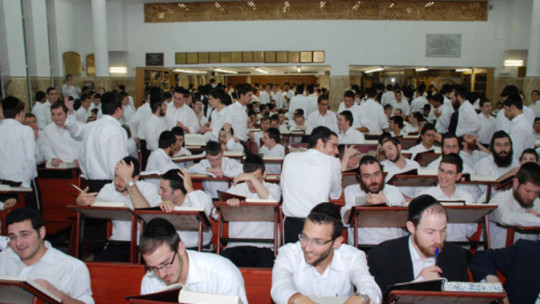
View On WordPress
0 notes
Text
תהילים צ"ד
אֵל־נְקָמ֥וֹת יְהֹוָ֑ה אֵ֖ל נְקָמ֣וֹת הוֹפִֽיעַ׃ הִ֭נָּשֵׂא שֹׁפֵ֣ט הָאָ֑רֶץ הָשֵׁ֥ב גְּ֝מ֗וּל עַל־גֵּאִֽים׃ עַד־מָתַ֖י רְשָׁעִ֥ים ׀ יְהֹוָ֑ה עַד־מָ֝תַ֗י רְשָׁעִ֥ים יַעֲלֹֽזוּ׃ יַבִּ֣יעוּ יְדַבְּר֣וּ עָתָ֑ק יִ֝תְאַמְּר֗וּ כׇּל־פֹּ֥עֲלֵי אָֽוֶן׃ עַמְּךָ֣ יְהֹוָ֣ה יְדַכְּא֑וּ וְֽנַחֲלָתְךָ֥ יְעַנּֽוּ׃ אַלְמָנָ֣ה וְגֵ֣ר יַהֲרֹ֑גוּ וִ֖יתוֹמִ֣ים יְרַצֵּֽחוּ׃ וַ֭יֹּ֣אמְרוּ לֹ֣א יִרְאֶה־יָּ֑הּ וְלֹא־יָ֝בִ֗ין אֱלֹהֵ֥י יַעֲקֹֽב׃ בִּ֭ינוּ בֹּעֲרִ֣ים בָּעָ֑ם וּ֝כְסִילִ֗ים מָתַ֥י תַּשְׂכִּֽילוּ׃ הֲנֹ֣טַֽע אֹ֭זֶן הֲלֹ֣א יִשְׁמָ֑ע אִֽם־יֹ֥צֵֽר עַ֝֗יִן הֲלֹ֣א יַבִּֽיט׃ הֲיֹסֵ֣ר גּ֭וֹיִם הֲלֹ֣א יוֹכִ֑יחַ הַֽמְלַמֵּ֖ד אָדָ֣ם דָּֽעַת׃ יְֽהֹוָ֗ה יֹ֭דֵעַ מַחְשְׁב֣וֹת אָדָ֑ם כִּי־הֵ֥מָּה הָֽבֶל׃ אַשְׁרֵ֤י ׀ הַגֶּ֣בֶר אֲשֶׁר־תְּיַסְּרֶ֣נּוּ יָּ֑הּ וּֽמִתּוֹרָתְךָ֥ תְלַמְּדֶֽנּוּ׃ לְהַשְׁקִ֣יט ל֭וֹ מִ֣ימֵי רָ֑ע עַ֤ד יִכָּרֶ֖ה לָרָשָׁ֣ע שָֽׁחַת׃ כִּ֤י ׀ לֹא־יִטֹּ֣שׁ יְהֹוָ֣ה עַמּ֑וֹ וְ֝נַחֲלָת֗וֹ לֹ֣א יַעֲזֹֽב׃ כִּֽי־עַד־צֶ֭דֶק יָשׁ֣וּב מִשְׁפָּ֑ט וְ֝אַחֲרָ֗יו כׇּל־יִשְׁרֵי־לֵֽב׃ מִֽי־יָק֣וּם לִ֭י עִם־מְרֵעִ֑ים מִי־יִתְיַצֵּ֥ב לִ֝֗י עִם־פֹּ֥עֲלֵי אָֽוֶן׃ לוּלֵ֣י יְ֭הֹוָה עֶזְרָ֣תָה לִּ֑י כִּמְעַ֓ט ׀ שָׁכְנָ֖ה דוּמָ֣ה נַפְשִֽׁי׃ אִם־אָ֭מַרְתִּי מָ֣טָה רַגְלִ֑י חַסְדְּךָ֥ יְ֝הֹוָ֗ה יִסְעָדֵֽנִי׃ בְּרֹ֣ב שַׂרְעַפַּ֣י בְּקִרְבִּ֑י תַּ֝נְחוּמֶ֗יךָ יְֽשַׁעַשְׁע֥וּ נַפְשִֽׁי׃ הַֽ֭יְחׇבְרְךָ כִּסֵּ֣א הַוּ֑וֹת יֹצֵ֖ר עָמָ֣ל עֲלֵי־חֹֽק׃ יָ֭גוֹדּוּ עַל־נֶ֣פֶשׁ צַדִּ֑יק וְדָ֖ם נָקִ֣י יַרְשִֽׁיעוּ׃ וַיְהִ֬י יְהֹוָ֣ה לִ֣י לְמִשְׂגָּ֑ב וֵ֝אלֹהַ֗י לְצ֣וּר מַחְסִֽי׃ וַיָּ֤שֶׁב עֲלֵיהֶ֨ם ׀ אֶת־אוֹנָ֗ם וּבְרָעָתָ֥ם יַצְמִיתֵ֑ם יַ֝צְמִיתֵ֗ם יְהֹוָ֥ה אֱלֹהֵֽינוּ׃
#a relevant psalm for our time#Psalm 94#jumblr#nachamu nachamu ami#text traditional but copied from sefaria.org#I considered including a translation and then decided to use it as bait to get people looking it up on Sefaria 😁#if you daven weekday minyan you may recognize it as the psalm for Wednesday
23 notes
·
View notes
Text
Biblical Naming Puns in Quartz Plays

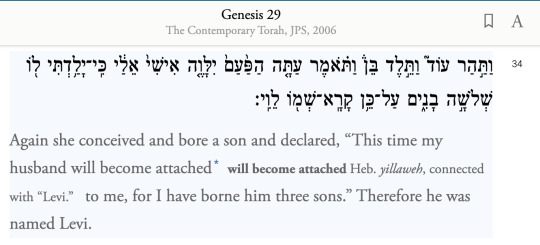
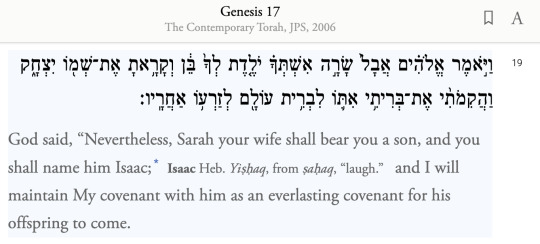
Both Levi and Isaac are biblical names whose meaning is explained in the text of Genesis. Shown here in the JPS translation, which includes in line explanations, in Genesis 29:34 we get Levi being given for its meaning as "to attach," or "to join." It shares a route with the word for wreath, so it could be said to have 'to join in a circle' connotation, which works very well with the etymology of kielce and circus, as well as the gear metaphor. He is the ringleader after all, another word that includes the connection to circles and rings.
Isaac comes from the word "to laugh". Shown is Genesis 17:19, though the incident it's referencing happens earlier. A fitting name for a clown, and even more fitting given some lines on Isaac's route, too. But again, this is a name picked based on the pun given in Genesis for it.
These are similar to Jacob in Mary Jane, which, according to Genesis 25:26 is a pun on the word for "heel". Mary names him that after getting the idea to make a doll out of corpse parts after picking up a heel off the beach.


Mary is almost certainly a biblical reference of a name, as well, but it isn't on the origin of the name and explanation for the word play involved.
These are all pretty specific references, but the pattern makes me fairly certain that all three are intentional.
Fun fact - Isaac is the father of Jacob who is the father of Levi, so this also represents three major generations of Genesis.
Whatever else he's got going on or shoved in that weird genius head of his, the Bible is clearly something in Neji's reference pool. Pretty deep-cut references too. With the "Raham" in Jire's poem, these represent some pretty close original textual readings. Some of the phrasing in the Jire poem also suggests at least a passing knowledge with Japanese Catholic liturgical phrasing or at least imitations there of.
But Neji's references don't stop here. The Oh Rama Havenna names seem to be based of Latin instead. He's dabbling in Greco-Roman mythology references elsewhere, Japanese mytho-history in I Am Death, linguistics, latin, possibly middle english, world literature, historical references and beyond. A fascinating place, Neji's mind.
So while I can totally see a reading that there's some religious background Neji is not telling us, I can also see him reading the bible from cover to cover with translation posts just for his reference pool "to make the greatest performance ever!"
#jackjeanne#jack jeanne meta#jack jeanne#sissia of the central nation#mary jane#allusions and references#shout of to Sefaria always and forever#neji#i feel like all posts about the plays themselves need a neji tag#seeing how ishida writes neji is some vindication for me as someone who came here from tokyo ghoul
12 notes
·
View notes
Text
The Sages taught in a Tosefta: One is forbidden to derive benefit from this world, which is the property of God, without reciting a blessing beforehand. And anyone who derives benefit from this world without a blessing, it is as if he is guilty of misuse of a consecrated object [...] Similarly, Rav Yehuda said that Shmuel said: One who derives benefit from this world without a blessing, it is as if he enjoyed objects consecrated to the heavens, as it is stated: “The earth and all it contains is the Lord’s, the world and all those who live in it” (Psalms 24:1). Rabbi Levi expressed this concept differently. Rabbi Levi raised a contradiction: It is written “The earth and all it contains is the Lord’s”, and it is written elsewhere “The heavens are the Lord’s and the Earth He has given over to mankind” (Psalms 115:16).

From Berakhot 35a: 1-21, via '100 Blessings a Day!' via Sefaria (My Ko-Fi Here)
#Berakhot 35a: 1-21#100 Blessings a Day#Sefaria#Jewish Studies#Religion & Magic#Prayer & Adoration#Quote
1 note
·
View note
